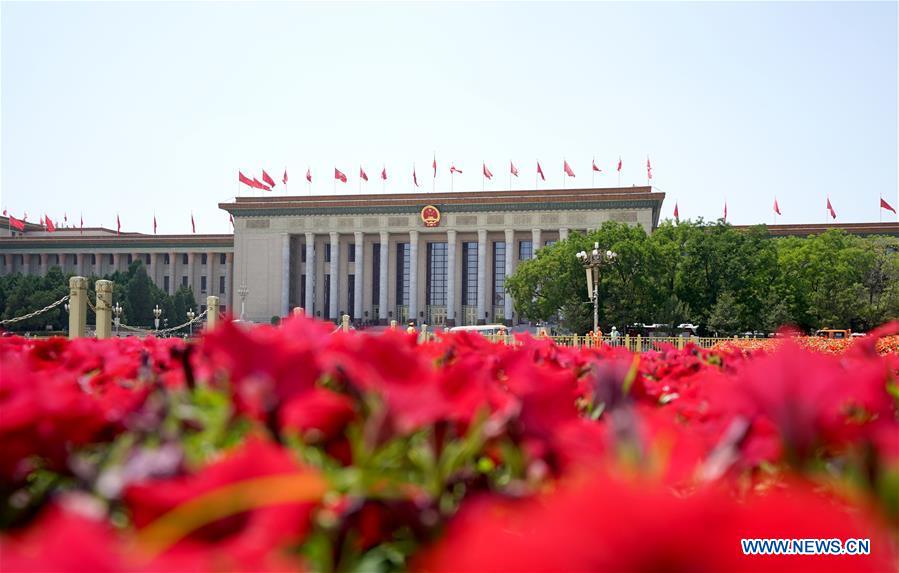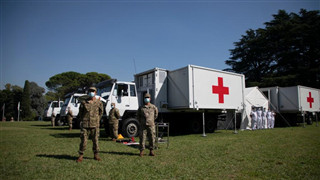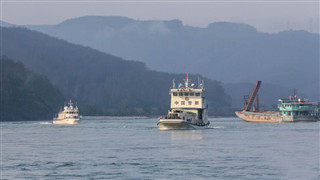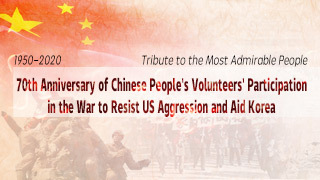
BEIJING - At the eight-day "two sessions," a key event in China's political calendar ending Thursday, the country has shown firm determination to eradicate absolute poverty and build a moderately prosperous society in all respects.
The third session of the 13th National People's Congress and third session of the 13th National Committee of the Chinese People's Political Consultative Conference were convened in a special year marked by development milestones and unprecedented challenges from COVID-19.
Here are some of the key messages and signals sent from the key political gathering:
Homestretch to key milestones
This year, China is in the final push in poverty alleviation and completing the building of a moderately prosperous society in all respects, a centenary goal reflecting China's "people first" governing philosophy.
Despite COVID-19 uncertainties, the country's timetable remains unchanged for the development milestones. China is resolute in completing the toughest mission of its battle against poverty by lifting its remaining poor population out of poverty.
Thinking outside the GDP box
In light of COVID-19 uncertainties and the global economic and trade environment, China has set no specific target for 2020 economic growth.
The decision was made because the country will face some factors that are difficult to predict in its development due to the great uncertainty regarding the COVID-19 pandemic and the world economic and trade environment.
China aims to create over 9 million new urban jobs, record a further drop in energy consumption per unit of GDP, and save more than 2.5 trillion yuan (about 350 billion U.S. dollars) for enterprises throughout the year.
Expanding investment for smarter, connected future
Amid contraction of global trade and investment, China aims to spur effective domestic investment by planning more special local government bonds, with priority given to new infrastructure, new urbanization initiatives and key projects.
Major moves will focus on developing next-generation information networks, expanding 5G applications, building more charging facilities and promoting wider use of new energy vehicles.
Rather than resorting to a massive flood-like stimulus to prop up growth, China is seeking more precise investments in projects that are able to incubate innovation and fortify foundations for future economic and social development.
East and West, coordination is the best
Amid virus-caused disruptions to global economy and trade, China aims to create a new development pattern that domestic and foreign markets can boost each other, with the domestic market as the mainstay.
The country will continue to promote large-scale development in the western region, the full revitalization of the northeast, the rise of the central region, and the trailblazing development of the eastern region. It will also advance coordinated development of the Beijing-Tianjin-Hebei region, the development of the Guangdong-Hong Kong-Macao Greater Bay Area, and the integrated development of the Yangtze River Delta.
China will actively expand imports, especially with the help of the third China International Import Expo to be held later this year.
To facilitate foreign investment, China will further implement the foreign investment law, shorten the negative list for foreign investment, further open up the service sector, and improve the business environment. Also, China's confidence and determination to join hands with other countries in advancing the Belt and Road remain unchanged despite the pandemic.
Milestone in advancing rule of law
China's long-expected civil code, adopted at the closing meeting of the annual legislative session, is a milestone in the country's advancement of the rule of law.
In addition to general provisions and supplementary provisions, the code has six parts on property, contracts, personality rights, marriage and family, inheritance and tort liabilities.
The civil code fully reflects the vision of people-centered development and highlights respect and protection of personality rights by incorporating personality rights provisions into an independent part.
Putting people's lives above everything else
While going all out to implement regular epidemic prevention and control, China will step up efforts in building a stronger public health protection network to better protect people's lives and health.
Such efforts include reforming disease prevention and control system, boosting the capacity for epidemic monitoring, early warning and emergency response, perfecting the treatment system for major epidemics, improving public health emergency laws and regulations, and launching extensive initiatives to improve public sanitation.
These efforts are a manifestation of China's steadfast commitment to human rights protection. They will help fix the weak links in public health and medical service systems, and contribute to building a moderately prosperous society in all respects.
Safeguarding sovereignty, security, development interests
China's national legislature has adopted a decision on national security legislation for the Hong Kong Special Administrative Region, a move necessary for closing the legal loopholes in Hong Kong.
The central government will continue to fully and faithfully implement the policy of "one country, two systems." It will support Hong Kong and Macao in growing their economies, improving living standards and better integrating their development into China's overall development, and help them maintain long-term prosperity and stability.
China will adhere to the major principles and policies on the work related to Taiwan and resolutely oppose and deter any secessionist activities seeking "Taiwan independence."
Advancing toward shared future for humanity
China has reaffirmed that it will always pursue an independent foreign policy of peace, and continue to advance friendship and cooperation with other countries as it opens up wider to the rest of the world.
China stands ready to work with other countries to strengthen international cooperation on epidemic prevention and control, promote global economic stability and advance global governance.
The country will uphold the international system with the United Nations at its core and an international order based on international laws, and push for the building of a community with a shared future for humanity.











